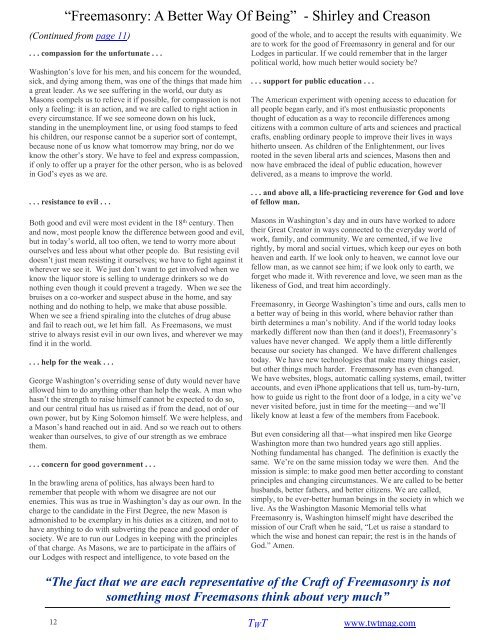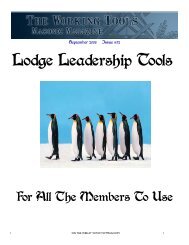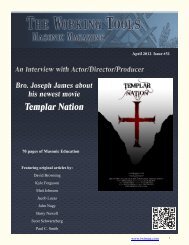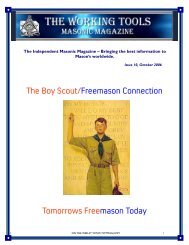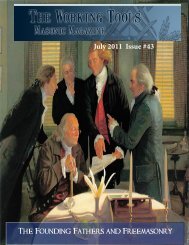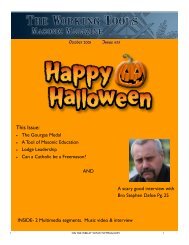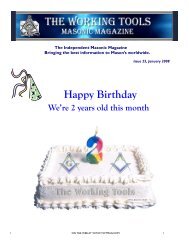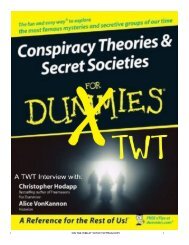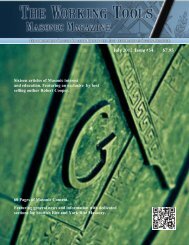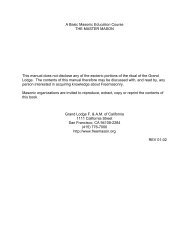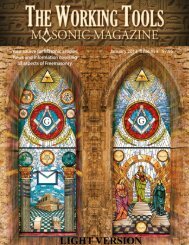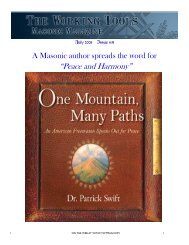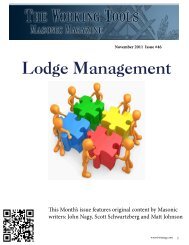The Working Tools Magazine âLightâ Version - Hawthorne-Fortitude ...
The Working Tools Magazine âLightâ Version - Hawthorne-Fortitude ...
The Working Tools Magazine âLightâ Version - Hawthorne-Fortitude ...
Create successful ePaper yourself
Turn your PDF publications into a flip-book with our unique Google optimized e-Paper software.
“Freemasonry: A Better Way Of Being” - Shirley and Creason<br />
(Continued from page 11)<br />
. . . compassion for the unfortunate . . .<br />
Washington’s love for his men, and his concern for the wounded,<br />
sick, and dying among them, was one of the things that made him<br />
a great leader. As we see suffering in the world, our duty as<br />
Masons compels us to relieve it if possible, for compassion is not<br />
only a feeling: it is an action, and we are called to right action in<br />
every circumstance. If we see someone down on his luck,<br />
standing in the unemployment line, or using food stamps to feed<br />
his children, our response cannot be a superior sort of contempt,<br />
because none of us know what tomorrow may bring, nor do we<br />
know the other’s story. We have to feel and express compassion,<br />
if only to offer up a prayer for the other person, who is as beloved<br />
in God’s eyes as we are.<br />
good of the whole, and to accept the results with equanimity. We<br />
are to work for the good of Freemasonry in general and for our<br />
Lodges in particular. If we could remember that in the larger<br />
political world, how much better would society be?<br />
. . . support for public education . . .<br />
<strong>The</strong> American experiment with opening access to education for<br />
all people began early, and it's most enthusiastic proponents<br />
thought of education as a way to reconcile differences among<br />
citizens with a common culture of arts and sciences and practical<br />
crafts, enabling ordinary people to improve their lives in ways<br />
hitherto unseen. As children of the Enlightenment, our lives<br />
rooted in the seven liberal arts and sciences, Masons then and<br />
now have embraced the ideal of public education, however<br />
delivered, as a means to improve the world.<br />
. . . resistance to evil . . .<br />
Both good and evil were most evident in the 18 th century. <strong>The</strong>n<br />
and now, most people know the difference between good and evil,<br />
but in today’s world, all too often, we tend to worry more about<br />
ourselves and less about what other people do. But resisting evil<br />
doesn’t just mean resisting it ourselves; we have to fight against it<br />
wherever we see it. We just don’t want to get involved when we<br />
know the liquor store is selling to underage drinkers so we do<br />
nothing even though it could prevent a tragedy. When we see the<br />
bruises on a co-worker and suspect abuse in the home, and say<br />
nothing and do nothing to help, we make that abuse possible.<br />
When we see a friend spiraling into the clutches of drug abuse<br />
and fail to reach out, we let him fall. As Freemasons, we must<br />
strive to always resist evil in our own lives, and wherever we may<br />
find it in the world.<br />
. . . help for the weak . . .<br />
George Washington’s overriding sense of duty would never have<br />
allowed him to do anything other than help the weak. A man who<br />
hasn’t the strength to raise himself cannot be expected to do so,<br />
and our central ritual has us raised as if from the dead, not of our<br />
own power, but by King Solomon himself. We were helpless, and<br />
a Mason’s hand reached out in aid. And so we reach out to others<br />
weaker than ourselves, to give of our strength as we embrace<br />
them.<br />
. . . concern for good government . . .<br />
In the brawling arena of politics, has always been hard to<br />
remember that people with whom we disagree are not our<br />
enemies. This was as true in Washington’s day as our own. In the<br />
charge to the candidate in the First Degree, the new Mason is<br />
admonished to be exemplary in his duties as a citizen, and not to<br />
have anything to do with subverting the peace and good order of<br />
society. We are to run our Lodges in keeping with the principles<br />
of that charge. As Masons, we are to participate in the affairs of<br />
our Lodges with respect and intelligence, to vote based on the<br />
. . . and above all, a life-practicing reverence for God and love<br />
of fellow man.<br />
Masons in Washington’s day and in ours have worked to adore<br />
their Great Creator in ways connected to the everyday world of<br />
work, family, and community. We are cemented, if we live<br />
rightly, by moral and social virtues, which keep our eyes on both<br />
heaven and earth. If we look only to heaven, we cannot love our<br />
fellow man, as we cannot see him; if we look only to earth, we<br />
forget who made it. With reverence and love, we seen man as the<br />
likeness of God, and treat him accordingly.<br />
Freemasonry, in George Washington’s time and ours, calls men to<br />
a better way of being in this world, where behavior rather than<br />
birth determines a man’s nobility. And if the world today looks<br />
markedly different now than then (and it does!), Freemasonry’s<br />
values have never changed. We apply them a little differently<br />
because our society has changed. We have different challenges<br />
today. We have new technologies that make many things easier,<br />
but other things much harder. Freemasonry has even changed.<br />
We have websites, blogs, automatic calling systems, email, twitter<br />
accounts, and even iPhone applications that tell us, turn-by-turn,<br />
how to guide us right to the front door of a lodge, in a city we’ve<br />
never visited before, just in time for the meeting—and we’ll<br />
likely know at least a few of the members from Facebook.<br />
But even considering all that—what inspired men like George<br />
Washington more than two hundred years ago still applies.<br />
Nothing fundamental has changed. <strong>The</strong> definition is exactly the<br />
same. We’re on the same mission today we were then. And the<br />
mission is simple: to make good men better according to constant<br />
principles and changing circumstances. We are called to be better<br />
husbands, better fathers, and better citizens. We are called,<br />
simply, to be ever-better human beings in the society in which we<br />
live. As the Washington Masonic Memorial tells what<br />
Freemasonry is, Washington himself might have described the<br />
mission of our Craft when he said, “Let us raise a standard to<br />
which the wise and honest can repair; the rest is in the hands of<br />
God.” Amen.<br />
“<strong>The</strong> fact that we are each representative of the Craft of Freemasonry is not<br />
something most Freemasons think about very much”<br />
12 T W T<br />
www.twtmag.com


